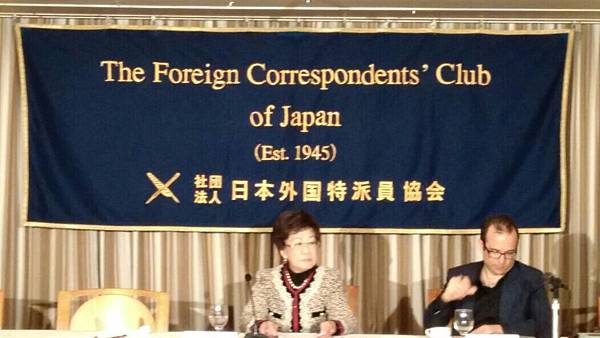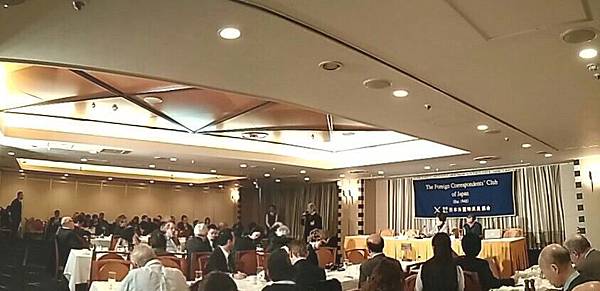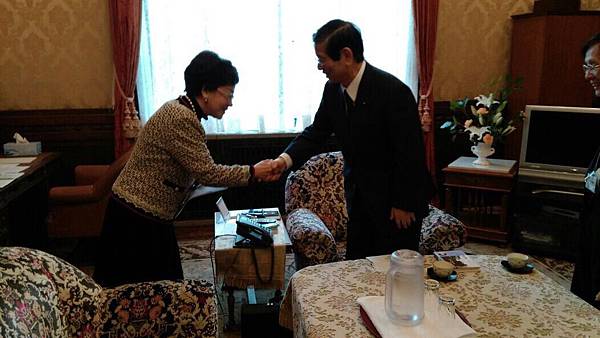Peace & Neutrality:
Taiwan’s Option in the Changing Asia-Pacific
Annette Lu Hsiu-lien, Vice President of Republic of China (Taiwan) 2000-2008,
Press release at the Foreign Correspondent Club of Japan, Tokyo, Feb. 24, 2015

Four years ago, I came to visit the disastrous area suffered from March 11 earthquake and tsunami. Taiwanese people shared deeply with the grievance of Japanese and made a great donation, demonstrating that Taiwan and Japan are good neighbors.
This time I come to Tokyo to see how prosperous and vigrous Japan has become under the excellent leadership of Prime Minister Abe.
Today, I’m honored to speak before you on Taiwan’s Option in the Changing Asia-Pacific: A National Plebiscite for Peace and Neutrality.

Chinese Dream vs. U.S. Pivot to Asia
The Asia Pacific has become a key engine of global politics and global economy. We are concerned about China’s rapid military modernization to alter the balance of power in Asia Pacific and to destabilize with nearby countries. President Xi Jinping made his first statement regarding foreign policy at the party’s Political Bureau in January 2013. He stressed on “the core national interests,” including territory, sovereignty, security, stability, and development, and added that China would never make any concession on those core interests. He also spoke to the military that to enrich the country and to empower the army are their Chinese Dream, a dream to make China a Great Power.
Back in the spring of 2007. A Chinese military leaderproposed to the U.S. Pacific Commander Admiral Timothy Keating that the Pacific Ocean should be managed jointly by China and America on each side,Hawaii to the East for the U.S, and Hawaii to the West for China. The policy of joint-management of the Pacific apparently has become part of China’s Dream of Great Power.
In recent years, Beijing has taken provocative and aggressive actions to neighboring territorial seas in both East China Sea and South China Sea to bolster its maritime claims, causing conflicts with Japan, the Philippines and Vietnam.
To respond to China’s hegemony, President Obama, has initiated and sought a Pivot to Asia policy to reassure America’s allies and partners, and to counterbalance China’s militant and aggressive pursuit of its territorial expansion and domination of the region. In addition, the pivot seeks also to expand trade and investment (TPP) and to advance democracy and human rights in the region.
The U.S. also insists that freedomof navigation and over flight in the Asia Pacific is its vital national interest. Japan, India and most ASEAN members, welcome U.S. rebalancing to offset China’s domination and hegemony. Others like Indonesia, Thailand and Malaysia seem ambivalent.
The 21centery appears to be a competition between the Chinese Dragon and the American Eagle. But which one will be the winner?
Why Taiwan Matters?
Ironically and surprisingly, the Obama administration has rarely mentioned Taiwan in the context of the pivot.
Does Taiwan matter? Some U.S. analysts have called attention to the significant strategic role that Taiwan could and should play in the U.S. pivot economically, politically, and militarily. In an article (in The Diplomat in April 2013) on “Why the U.S. Military Needs Taiwan,” It states that “Taiwan is a core interest of the United States and has pivotal role to play as an ad hoc coalition partner.”
Likewise, another essay on “Taiwan’s Critical Role in the U.S. Pivot to Asia” argued that Taiwan could “contribute important cyber knowledge, communication capabilities and intelligence to U.S. defense efforts in the Asia-Pacific region.”
Geopolitically and strategically, Taiwan is located in the First Island Chain. While the U.S. tries to strengthen the First Island Chain, China tries to breach the Chain. Owning Taiwan, China’s naval ships and aircrafts can have free access to the Pacific Ocean and directly challenge the U.S.-Japan Alliance. Taiwan, wishes to plays a key role in regional peace and security. But if Taiwan was forced by China tostart political talks and finally agree on signing confidence-building measures and peace accord under the “One China” framework, Taiwan will become another Hong Kong, China will breach the First Island Chain and control the East China Sea, South China Sea, and the Taiwan Strait. In other words, China would obtain free access to the ocean in between the first and second Island Chain. A great menace to the balance of power in this region.
Small in size, but Taiwan harbors 26 principal surface combatants in five naval bases. Additional eight commercial or industrial ports can be converted for military purpose in time of war. No less than twenty three larger fishing ports are capable for the anchorage of Taiwan’s newly commissioned fast missile boats. Taiwan’s Air Forces have some 300 front-line combat fighters stationed at five major bases. Small in size, Taiwan is sturdy in military strength.
Politically, Taiwan is the lighthouse of liberty and success in Asia. Its unique developments in human rights, democracy, peace, love and high-tech elaborates the strength of soft power. Taiwan has created and enriched those universal values to enlighten people living in the Communist regimes. Integrating Taiwan with the democratic allies will consolidate the strength to defend and develop the Asia Pacific.
Economically, today Taiwan ranks at the 20th largest economy in the world in terms of purchasing power parity, ahead of such economies as Argentina, the Netherlands, Hong Kong, Switzerland, and Singapore. Even on a strictly per capita GDP basis, Taiwan ranks 27th in the world, ahead of the UK (33rd), Japan (36th), the EU (39th), and South Korea (40th). Similarly, Taiwan ranks 20th in the world in the Heritage Foundation’s 2013 Index of Economic Freedom, well above China’s ranking in 136th place.
The people of Taiwan have much to be proud of. We struggled and fought hard, and I personally spent 1933 days in jail, to do away with the yoke of KMT dictatorship, and to build a system of democracy, freedom and human rights and the rule of law. Taiwan has stood in stark contrast with the Marxist-Leninist rule of a one-party state of China.
Last year, college students occupied the parliamentary chamber to protest against President Ma’s pro-China policies. Last November, Taiwan held the 9-in-1 municipal and local elections. The ruling KMT party suffered a crushing defeat and the opposition Democratic Progressive Party (DPP) scored an impressive victory. Voters used their ballots to cast a vote of no confidence against the Ma government and his pro-China policies. Analysts expect that the anti-Ma and anti-China domino would drive the KMT out of national government and bring the DPP back to power.
PRC’s Strategy to Annex Taiwan
Beijing has much at stake in changes in Taiwan’s government leadership and in cross-strait policy. Beijing has been exerting greater pressure on Ma to enter a peace agreement and eventual unification. President Xi will try to set the train in motion while Ma remains in office and create an irreversible framework to lock Taiwan into the “One China” cage that could not be undone even if the DPP were to return to power in 2016.
In fact, the PRC has designated a 3-year pivotal strategy starting from this year, 2015 till 2017 to resolve Taiwan problem. The first step is to seduce Ma to surrender and the second is to support the KMT candidate to win the presidential election. The third step is that if DPP wins in 2016, Beijing would mobilize its front groups in Taiwan to launch a “peaceful reunification campaign” across the island. For these purposes, Taiwanese businessmen on the mainland are forced to oppose the DPP, and China is suspected to have financed pro-Beijing candidates for Taiwan’s elections. Moreover, the world’s once tallest building, Taipei 101, seems to have become China’s Trojan Horse (secret liaison headquarters), not only thousands Chinese tourists visited there every day, also some Chinese VIPs use the venue to meet with Taiwanese politicians and businessmen.

Chinese President Xi has been pressing President Ma to sign an agreement on military confidence building measures, designed to terminate U.S. arms sales to Taiwan and to do away Taiwan-U.S. security cooperation, and on a cross-strait peace accord that will lead to eventual annexation.
If Taiwan were annexed by the PRC, imagine what the situation would be in the region? Remember that Taiwan has 5 naval bases, 8 commercial or industrial ports convertible for militancy purpose, plus 34 larger fishing ports on the island.
Peace & Neutrality as a Preventive Defense
Concerned that Taiwan’s security and sovereignty is being gradually negotiated away and taken over by the communist China, a group of civic organizations has founded a “Peace and Neutrality for Taiwan Alliance.”
The Alliance recruits Peace Ambassadors in Taiwan and abroad to actively promote its cause at home and overseas, including Taiwanese businessmen based in the United States, Central and South America, Asia, and even Africa. Taiwan’s peace and neutrality is not a partisan issue and should be supported by all Taiwanese who care about Taiwan’s future.
As in the case of armed neutrality in Switzerland and Sweden, Taiwan will need to build up its national defense to safeguard its security and neutrality. Both U.S. and Japan consider a self-ruled Taiwan an integral part of Japan’s security and of vital interest to the U.S., In the wake of a “2+2” meeting between the American Secretaries of State and Defense and their Japanese counterparts in 2005, the two allies affirmed their common interests in safeguarding peace and security in the Taiwan Strait.
As a state of neutrality, Taiwan is of immense importance to Japan, India, and the ASEAN. It will bolster freedom of navigation and safety in the Taiwan and Bashi Straits, two important pathways for international air and sea transport, with over thousands of planes and vessels passing through these waters and airspace above daily.
The outcome of the plebiscite and the Taiwanese people’s quest for neutrality is a clear answer to Beijing’s plan to annex the nation. In strategic terms, promotion of Taiwan’s neutrality is a measure of preventive defense to counter Beijing’s plot of annexation.
What is the Alliance undertaking to achieve its goals?
First, the Alliance is collecting signatures by concerned citizens to initiate a national plebiscite on Taiwan’s neutrality. As soon as the 90,500 signatures are collected the initiative proposal for the plebiscite will be submitted to the government for it to determine. Then, over 905,000 new signatures supporting the proposal will be needed before the referendum can be legally conducted.
Prior to Taiwan’s municipal and local elections last November, I spoke in support of candidates at numerous campaign rallies and concurrently promoted for Taiwan’s peace and neutrality. The responses of the crowd were highly favorable and dozens of municipal council members have pledged to join the Legion of Peace Ambassadors to help the cause. Next month, a delegation of the municipal councilors will visit their sister cities seeking for grass-root support in the U.S., before seeking for support in Washington, D.C.
In accordance with the law of plebiscite, a debate on the pros and the cons of neutrality needs to be conducted. Such a debate can be expected to generate widespread international publicity and bring attention on Taiwan’s future, much like the independence referendum in Scotland last September. If the majority of voters favor neutrality, the government must announce their choice to the world. Along with the plebiscite campaign, Taiwanese at home and abroad will work for international support and recognition, as Switzerland did in 1815 and Turkmenistan in 1995.
The campaign for neutrality is a long journey, and the procedure of a national plebiscite will be complicated and difficult, but the journey of 1,000 miles must start with a first step now.
120 years ago, Taiwan was ceded to Japan under the Treaty of Shimonoseki as a result of the defeat of Qing Dynasty by Japan. Today we are here in Tokyo not to complain about the past, rather to urge understanding and cooperation for the future.

Sincerely and seriously, I urge friends in Japan and from other part of the world to support Taiwan to become a country for peace and neutrality. Japan will benefit from it since a neutral Taiwan takes no sides in regional conflicts, and Taiwan would not allow China to take advantage of its harbors and air force bases in potential conflicts either in East China Sea or in South China Sea. Taiwan has made miracles before and will make another miracle for regional stability and world peace.
Thank you.



 留言列表
留言列表
